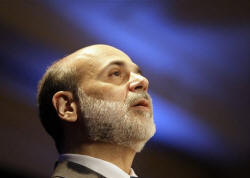 |
|

 Bernanke asks Congress to empower regulators
Bernanke asks Congress to empower regulators
[October 01, 2009] WASHINGTON (AP) -- Federal Reserve Chairman Ben Bernanke says federal regulators should be responsible for ensuring that the financial institutions they oversee don't become so big and unwieldy that their failure could bring down the economy.
|
In testimony prepared for a House hearing on Thursday, obtained in advance by The Associated Press, Bernanke said Congress should establish a council of regulators to monitor large, influential firms like insurance giant AIG. Individual regulators should be able to act on their own to ensure these firms don't become so highly leveraged in the first place, Bernanke said. President Barack Obama has said the Fed should ultimately be in charge of deciding when a firm has become so big and dangerous that it should be dismantled. "To further encourage a more comprehensive and holistic approach to financial oversight, all federal financial supervisors and regulators -- not just the Federal Reserve -- should be directed and empowered to take account of risks to the broader financial system as part of their normal oversight responsibilities," Bernanke told the House Financial Services Committee in his prepared remarks. Obama's proposal to task the Fed with preventing the next economic collapse hasn't fared well on Capitol Hill, where lawmakers have little power over the central bank. While the Fed frequently reports to Congress, it maintains an independent status aimed at keeping politics out of the nation's monetary policy. Lawmakers, who are planning to take up the financial reform bill this fall, say it is likely that they would put a council of regulators in charge of so-called "systemic risk" instead of consolidating that power primarily within the Federal Reserve, as Obama wants. In his testimony, Bernanke voiced support for other aspects of Obama's plan, including:
|



